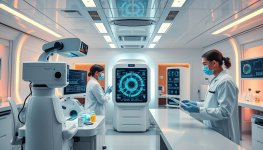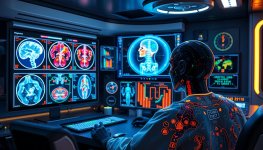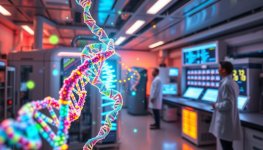Early Disease Detection Tech Advances: A New Era in Health
Did you know the global market for early disease detection tech is set to hit $54.8 billion by 2027? This huge growth shows how these new technologies are changing healthcare. They bring us proactive and personalized care. With AI, machine learning, wearable devices, and genomic sequencing, we're seeing a big shift in how we care for our health.In this article, we'll look at how these new techs are changing medical diagnostics and healthcare. They're making healthcare better and leading to better patient results. Get ready to explore the exciting world of tech for early disease detection advances, AI in healthcare, machine learning for medical diagnosis, and predictive analytics in medicine.

Key Takeaways
- The global market for early disease detection technologies is poised to reach $54.8 billion by 2027.
- Advancements in AI, machine learning, and predictive analytics are transforming medical diagnostics and healthcare delivery.
- Wearable technologies and continuous health monitoring are enabling earlier detection and more personalized care.
- Genomic sequencing and personalized disease prevention are paving the way for more targeted and effective treatments.
- Telemedicine and remote disease screening are improving access to healthcare and enhancing patient engagement.
The Revolution of Early Disease Detection Technologies
The world of medical diagnostics is changing fast. This is thanks to new advances in biomedical data science, computational biology, digital health technologies, and precision medicine. These changes are making it possible to spot diseases early. This means doctors can start treating patients sooner and give care that fits each person's needs.Current State of Medical Diagnostics
Old ways of finding diseases were mostly about reacting to symptoms. But now, new tech is changing this. With the help of advanced science and biology, doctors can find signs of disease before symptoms show up.Impact on Healthcare Delivery
Early disease detection is changing how healthcare works. Doctors can now start treatments sooner and prevent problems. This helps the healthcare system and makes patients healthier. Wearable devices and online monitoring help patients help themselves too.Benefits for Patient Outcomes
Early detection of disease is good for patients. They get treatments that fit their genes and health. This makes treatments work better and reduces side effects. It leads to a better life and health in the long run.The change in medical diagnostics is big. It's making healthcare better. With new science and tech, doctors can find diseases early. They can give care that's just right for each patient and help patients take charge of their health.
"The integration of cutting-edge technologies is reshaping the paradigm of medical diagnostics, enabling the identification of health issues at their earliest stages."
AI and Machine Learning in Medical Diagnostics
The field of medical diagnostics is changing fast, thanks to AI and machine learning. These technologies are changing how doctors find and treat diseases.Medical imaging AI is a big deal here. It looks at lots of medical scans to find patterns that might show diseases like cancer. This makes diagnosis more accurate and quicker, helping doctors make faster treatment plans.
Digital pathology is also getting a boost from AI and machine learning. These tools help pathologists look at digital images of tissues to spot diseases more precisely. This is key for predictive analytics for disease, helping doctors understand how diseases will progress.
AI is also helping create better models for disease and treatment. It looks at huge amounts of patient data to find patterns and risks. This results in care plans that are more individualized and efficient.
As these technologies keep improving, the future of medical diagnostics looks bright. It's heading towards a more personalized, data-driven healthcare era."Medical diagnosis has advanced significantly with the application of AI and machine learning. It's changing healthcare for the better, helping both patients and doctors."

Wearable Technologies and Continuous Health Monitoring
Wearable technologies are changing how we watch our health. These wearable health monitoring devices, with biomedical sensors, are making healthcare more personal and proactive.These wearables track many health signs like heart rate and sleep. They give a full view of our health, helping spot problems early.
Thanks to wearable health monitoring and digital biomarkers, we now have early warning systems for diseases. These systems watch our health data closely. They catch small changes, helping doctors act fast to prevent bigger problems.
These advances do more than help us stay healthy. They also help researchers understand health trends in big groups. This leads to better public health plans and actions.
The future of healthcare looks bright with wearable health monitoring and biomedical sensors. We're moving towards a more personal and proactive healthcare. With digital biomarkers and early warning systems for diseases, we're on the path to a new era of medicine."Wearable technologies are not just about tracking fitness - they're transforming the way we approach healthcare, empowering individuals to be active participants in their own well-being."

Genomic Sequencing and Personalized Disease Prevention
In healthcare, genomic sequencing analysis and biomarker detection technology have started a new chapter. These tools give us deep insights into our genes. They help us take charge of our health.DNA Analysis Technologies
New genomic data mining methods have changed how we see the human genome. Scientists can now spot genetic signs of health risks. This leads to better precision medicine.Predictive Genetic Testing
Predictive genetic testing is key in catching diseases early. It lets doctors see if you might get certain illnesses. This helps you stay healthy and avoid big health problems.Personalized Treatment Plans
- Thanks to genomic sequencing analysis, doctors can make plans just for you.
- This means treatments fit your exact needs, making healthcare more effective.
- Using precision medicine means better health outcomes and less side effects.
As we use more genomic data mining and biomarker detection technology, healthcare is getting more personal. This is great news for those wanting to stay healthy and feel their best."Genomic sequencing has the potential to transform healthcare by enabling personalized disease prevention and targeted interventions."






